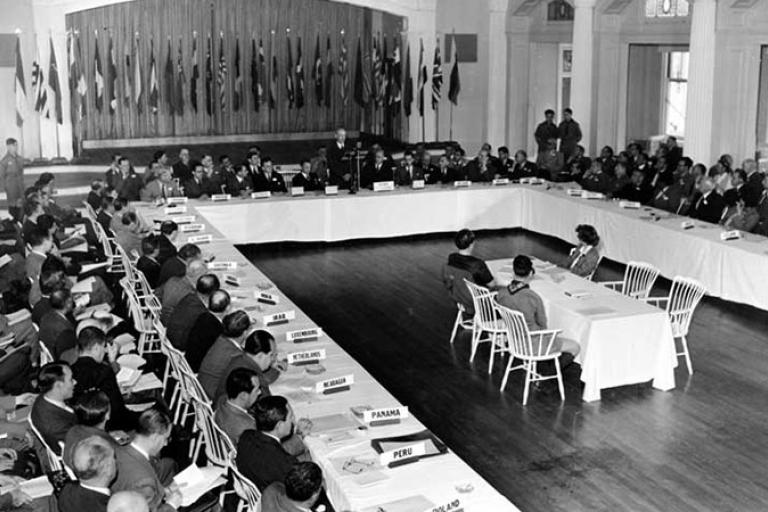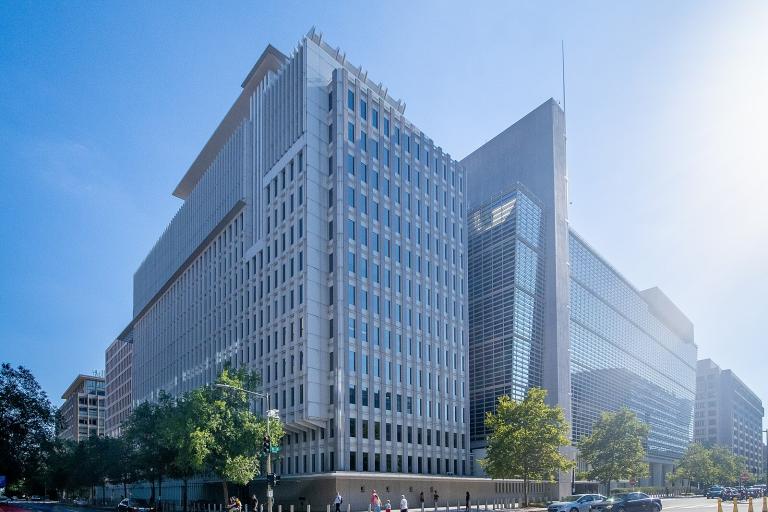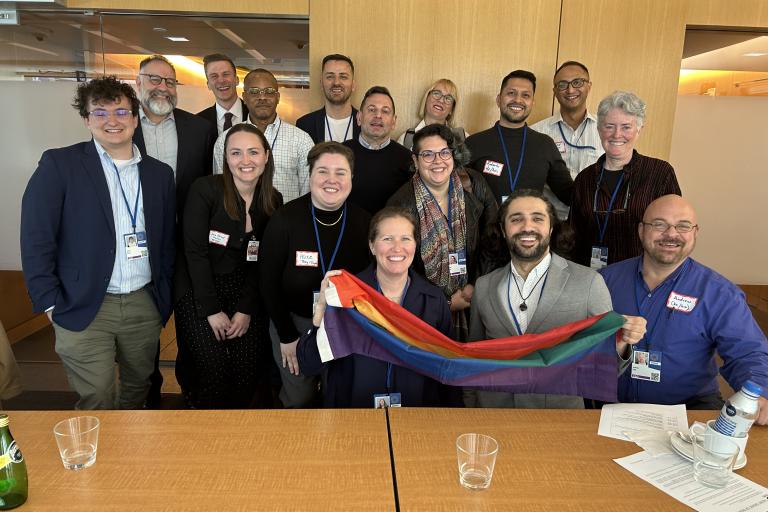
Insights
From Visibility to Economic Power: Building Inclusive Economies for LGBTIQ People
Region(s)
Type
Commentary
Author(s)
Publish Date
April 23, 2025
Share
In every corner of the world, the right to work and earn a living with dignity is fundamental. Yet for many lesbian, gay, bisexual, transgender, intersex, and queer (LGBTIQ) individuals, economic justice remains out of reach. Economic inclusion is both a development concern and a human rights issue – exclusion from the formal workforce threatens not only livelihoods but also safety and dignity. Globally, discrimination and legal barriers push countless LGBTIQ people into poverty or precarious informal jobs.
In fact, 62 jurisdictions criminalize consensual same-sex relationships, forcing many to hide who they are to keep a job or find one at all. Studies have shown that such exclusion carries a steep cost for society: homophobia and transphobia can cost as much as 1% of a country’s GDP. The cost of exclusion underscores that inclusive economies aren’t just a social ideal – they are a path toward resilience and shared prosperity.
For several years, Outright, other LGBTIQ groups, corporations, and major government funders have been expanding their focus on LGBTIQ economic inclusion. However, this year, LGBTIQ people are facing two major setbacks. Until this year, the US government had become a core supporter of LGBTIQ economic inclusion projects globally, including several Outright-administered projects that supported dozens of LGBTIQ groups in low and middle-income countries. As cataloged in Defunding Freedom: Impacts of U.S. Foreign Aid Cuts on LGBTIQ People Worldwide, an Outright report released in February 2025, the US government abruptly cut off all support to these projects, crippling many of these efforts with a stroke of the pen.
To compound the urgency, economic forecasts predict major hardships as international trading systems crumble. Low—and middle-income countries will be the hardest hit. Using the figure of 7% as an estimation of the LGBTIQ population, these countries are home to 500,000 LGBTIQ people. Because of their high levels of exclusion, these 500,000 people will face the worst of this potential economic crisis. Maintaining the progress of the movement and responding to the new economic realities will be the twin challenges facing stakeholders that seek to advance LGBTIQ people’s economic inclusion.
Economic Justice as a Global Human Rights Issue
When LGBTIQ people are shut out of stable employment, the impacts are far-reaching. Unemployment and underemployment rates for LGBTIQ communities are often significantly higher than average – nearly double in some contexts – leading to disproportionate levels of poverty and insecurity. Lack of formal work means lacking access to health care, housing, and safety nets, trapping many in a cycle of vulnerability. Conversely, inclusive economies where LGBTIQ people can participate openly are stronger and more equitable. Research from the World Bank and others indicates that countries with greater LGBTIQ inclusion tend to have higher economic output and human development. In other words, protecting LGBTIQ people from discrimination benefits everyone.
Exclusion from the formal workforce isn’t just about lost wages – it’s about human dignity. Being forced into hiding or pushed into informal, often unsafe jobs robs individuals of the chance to thrive. More than 60% of workers worldwide are in informal employment, and LGBTIQ people are often overrepresented in this precarious sector due to discrimination. This can mean a lack of legal protections, unstable incomes, and a heightened risk of exploitation or violence.
Simply put, economic exclusion reinforces marginalization. On the other hand, inclusive economies – where laws, workplaces, and communities embrace LGBTIQ people – allow individuals to reach their potential, build resilience, and contribute fully to society. Economic justice is thus inseparable from the broader rights of LGBTIQ people: when everyone can work without fear of prejudice, communities grow safer and more prosperous.

Systemic Barriers to LGBTIQ Economic Inclusion
From education to employment, LGBTIQ people face entrenched obstacles that hinder their economic participation. Outright’s research finds that the factors driving these gaps fall into a few broad categories:
- Lifelong discrimination eroding opportunity: Bias and bullying throughout life mean many LGBTIQ individuals end up with less education, skills, and work experience than others. This “human capital” gap starts early and follows them into the job market.
- Workplace stigma and harassment: Widespread prejudice leads employers to deny jobs or promotions to LGBTIQ candidates and creates hostile workplaces for those who are hired. From cruel jokes to violence, stigma makes it hard for LGBTIQ employees to stay and advance in their jobs.
- Legal and social exclusion: Of 193 UN member states, only 77 prohibit workplace discrimination based on sexual orientation, 46 on gender identity, 20 on gender expression, and 18 on sex characteristics. The lack of protective laws and policies means bias often goes unchecked, allowing a cycle of poverty and unemployment to persist.
One of the most fundamental barriers is education. Outright’s partners report that a lack of schooling is among the biggest reasons LGBTIQ people struggle to find formal employment.
In Bangladesh, for example, members of the hijra community, a distinct cultural group that identifies as transgender or third gender, often drop out of school due to harassment and exclusion. An LGBTIQ advocacy organization in Bangladesh shared with Outright the experience of one hijra learner, who told researchers: “I know educational qualifications are compulsory for getting a government job. But when I went to school, the school environment was not congenial… Every day, my classmates used to look down upon me… Sometimes I was assaulted… Then I could not continue my study.” The result is fewer qualifications and opportunities later in life. Similar patterns appear elsewhere: In Mexico, nearly 40% of LGBT students surveyed said they wanted to avoid school due to physical and sexual harassment. In Serbia, a World Bank research team conducted an experimental scenario that found that “feminine” boys (widely perceived as being gay) were at least three times more likely to be refused enrolment in primary schools compared to boys not perceived to be feminine. In Burundi, the Ministry of Education expressly cites “homosexuality” as a justifiable reason for expulsion.
And in the Philippines, even with anti-bullying laws on the books, many LGBTIQ students still skip classes or drop out to escape mistreatment. A lifetime of bias literally pushes LGBTIQ people out of the classroom and, eventually, out of the formal economy.
Even for those with education, basic paperwork can stand in the way of a job. Many trans individuals lack official identification documents that match their identity. For example, in Colombia, where all men must serve in the military, male job applicants must include documentation of their service – a “libreta militar” - with their job application. Because many trans men lack this documentation, they are shut out of job opportunities. Across all regions, countless transgender people have IDs that don’t reflect who they are, making every job application an ordeal of outing and potential rejection. The bureaucratic exclusion compounds the economic marginalization.
Once in the workforce, LGBTIQ employees frequently encounter unsafe and hostile workplaces. A central driver of this is stigma – pervasive beliefs that being LGBTIQ somehow makes a person “unfit” as a worker or colleague.
This prejudice can manifest as open harassment. In Bangladesh, two hijra women, Farah and Sanjana, were hired at a Dhaka garment factory as part of a job placement effort, only to face relentless abuse from coworkers. They endured insults and even a physical attack during their commute when other workers tried to assault them on the company bus. The factory owner intervened, first assigning the women to travel with senior staff – and when even some of his managers refused, he sent his own car to pick them up so they could commute safely.
A program coordinator in Dhaka noted that fear of such workplace harassment is a “core reason” many transgender people hesitate to seek company jobs at all. In Mexico, the dangers can also be extreme: one transgender woman recalled being raped by her supervisor and staying silent to keep her livelihood. “To keep the job, I had to keep my mouth shut… he said no one would believe a faggot like me,” she recounted, underscoring the horrific abuse some LGBTIQ employees endure.
These are not isolated incidents. In Colombia’s largest-ever survey of LGBT people, 40% of trans respondents – and roughly a quarter of lesbian, gay, and bisexual respondents – reported being fired or denied jobs due to their identity. In the Philippines, more than half of transgender men and women report workplace discrimination, rates many times higher than those for their cisgender peers. Yet because of stigma and fear, only about one-third of those who experience workplace harassment ever report it to authorities. The picture is clear: from hiring to daily workplace interactions, LGBTIQ people face an array of biases and threats that deny them decent work and stable incomes.
Grassroots Solutions: Inclusive Economies in Action

Faced with these systemic barriers, LGBTIQ communities and allies are forging solutions from the ground up. Outright International’s Inclusive Solutions program has been partnering with grassroots organizations in Bangladesh, Colombia, Mexico, and the Philippines to tackle economic exclusion head-on.
At a convening of these partners in 2024 in Medellín, Colombia, activists shared success stories and strategies for increasing LGBTIQ employment in the formal sector. Their approaches range from job training and placement to corporate inclusion campaigns – all aimed at turning visibility into real economic power for marginalized LGBTIQ people.
In Mexico, where violence and displacement often compound economic hardship, activists are opening doors for LGBTIQ refugees and locals alike. Casa Frida, a shelter and community center in Mexico City, is leveraging private-sector partnerships to help marginalized LGBTIQ people find safe, dignified jobs. With Outright’s backing, Casa Frida launched the Contrata LGBTIQ (Hire LGBTIQ) program, which connects queer and trans job seekers – including asylum seekers fleeing persecution – with companies that have pledged nondiscrimination and fair labor conditions. Any job offered through the program must come with proper benefits and policies protecting LGBTIQ staff. “We look for companies that want to do more than just celebrate Pride Month,” explains Ian Hernández, the program’s coordinator. In other words, employers must commit to substance over symbolism.
Since the program began in late 2021, about 100 businesses – from hotel chains to pharmaceutical firms – have teamed up with Casa Frida to fill over 200 job openings with LGBTIQ candidates. This effort is not only placing individuals into work; it’s also shifting workplace culture. Each participating company implements internal policies to welcome and safeguard LGBTIQ employees. For people like Sashe, an 18-year-old trans woman who told Outright she had been rejected by one employer after another for “not looking enough like a woman,” Contrata LGBTIQ offers a lifeline.
With legal support to fix her documents and training to boost her skills, Sashe is now interviewing with companies that value her for her abilities – a step toward the “dignified work” she dreams of, “where my pronouns and my body are respected, and I am free from any violence,” she says. The grassroots model pioneered by Casa Frida illustrates how targeted support and advocacy can transform lives, turning stigma and trauma into opportunity.
In the Philippines, activists take a slightly different tack: encouraging businesses to lead the change. The Philippine LGBT Chamber of Commerce (PLCC) has developed a certification program dubbed PRISE (Pride Seal of Excellence) to incentivize companies to adopt robust diversity and inclusion practices.
Supported by Outright, PRISE is advertised as Asia’s first SOGIE-based DEI certification – essentially a seal of approval for private-sector employers that meet stringent criteria on LGBTIQ workplace inclusion.
“Prise aims to enhance enterprises’ capacity to adopt inclusive policies and programs, thereby fostering a more equitable workplace environment,” says Ronn Astillas, PLCC’s.
To earn the certification, businesses will be evaluated on everything from anti-discrimination policies and employee resource groups to how they train staff and engage with the broader LGBTQ+ community. Alongside this initiative, the PLCC conducts workshops for LGBTIQ jobseekers on résumé writing, interview skills, and professionalism – empowering applicants to enter interviews with confidence. Although the Philippines does not yet have a nationwide law banning anti-LGBTIQ discrimination, efforts like PRISE create a proactive framework where companies voluntarily uphold equal opportunity. This not only helps open more doors to LGBTIQ talent in the job market, but it also makes good business sense: inclusive workplaces tend to attract diverse talent and foster innovation, benefiting the bottom line. By working both sides of the equation – preparing LGBTIQ individuals for employment and pushing employers to be truly inclusive – Filipino advocates hope to build momentum toward a culture where workplace discrimination is a thing of the past.
Across these case studies, a common thread emerges: change happens when LGBTIQ people and allies collaborate to tear down barriers from both ends. Whether it’s a trans community organization brokering jobs with enlightened employers, or a business chamber convincing companies that inclusion is good business, the grassroots solutions are as diverse as the communities they serve. What they share is a vision that goes beyond visibility to tangible empowerment – a world where coming out doesn’t mean economic hardship, and where LGBTIQ youth can envision a future of opportunity.
From Inclusion to Empowerment

The movement for LGBTIQ economic inclusion is nascent – global government and philanthropic funding for LGBTIQ labor and employment issues was just four percent of overall funding for LGBTIQ communities as of 2022 – and it is now existentially threatened by U.S. funding cuts, economic instability, and a corporate retreat from upholding fundamental principles of diversity, equity, and inclusion.
Yet the successes in Bangladesh, Mexico, the Philippines, Colombia, and beyond show that progress is possible. With more support, these initiatives can scale up, share lessons, and reach many more people who have been left behind. Donors and allies have a pivotal role to play in fueling this next frontier of the rights of LGBTIQ people movement. Investing in economic empowerment programs means investing in the long-term well-being and dignity of LGBTIQ individuals, helping to break cycles of poverty and exclusion. It means backing the idea that everyone – regardless of sexual orientation, gender identity or expression, or sex characteristics – deserves a fair chance to earn a living and build a stable future.
The cost of exclusion versus the benefits of inclusion is stark – and while some global leaders are retreating, others are waking up to this reality. From the World Bank acknowledging LGBTIQ inclusion in its development strategy to local organizations setting up programs to help LGBTIQ job applicants, there is growing recognition that economic justice for LGBTQ+ communities is integral to both sustainable economic development and human rights progress.
Yet, much work remains. Outright International’s 35 years of activism teach us that progress comes from persistent advocacy and collaboration. The road ahead calls for all stakeholders – governments, businesses, civil society, and everyday allies – to push harder for inclusive policies and practices. Regarding employers, this means enacting workplace nondiscrimination protections, promoting policies to hire and support LGBTIQ people in the workplace, and understanding the value of diversity. For LGBTIQ people, the focus is on building human capital – education, workplace experiences and job qualifications, entrepreneurship and business skills, knowledge about career opportunities, and legal documentation. LGBTIQ groups are doing this by working with corporations, operating training programs for LGBTIQ workers, providing support for LGBTIQ entrepreneurs, and legal assistance to secure appropriate documentation.
Much of this comes down to changing hearts and minds: celebrating LGBTIQ contributions to economies and countering the stigma that has long kept too many in the shadows. For 35 years, Outright International has championed the idea that LGBTIQ people deserve not just legal equality but also equal opportunity in life’s economic sphere.
Today, Outright continues to advance economic inclusion as a pillar of LGBTIQ human rights, working hand-in-hand with local and national organizations to drive change from the ground up. And, Outright cannot do this work alone. You can help: support Outright’s Inclusive Solutions work, amplify the stories of LGBTIQ entrepreneurs and workers, and advocate for policies that protect LGBTIQ livelihoods. In the journey from visibility to economic power, every contribution counts. By standing with LGBTIQ communities in their pursuit of economic justice, donors and supporters can help unlock the potential of millions of people, ensuring that equality isn’t just written in law but lived in daily life. It’s time to make “inclusive economies” more than a slogan – together, we can make it a global reality.

Take Action
When you support our research, you support a growing global movement and celebrate LGBTIQ lives everywhere.
Donate Now